As a rule, when we bring home fruit, we do one of two things: put everything in a vase on the tabletop or throw it in the fridge. The chance of a mistake is not so great, because almost all fruits can be stored in the refrigerator, and almost all fruits can last for at least a couple of days at room temperature. But if you want to get maximum pleasure and benefit from the gifts of nature and save the budget, it is worth a little to understand this issue.
In this material you will learn the general principles for storing bananas, apples, pears, lemons, tangerines and other fruits, you will find instructions on the conditions and periods of storage of various types of fruits and berries, as well as ideas on how to organize the content of "vitamins" in the home.
8 general principles of how to store fruit at home
Principle 1. Do not store fruits and vegetables together. Fruits that emit large amounts of ethylene (a ripening agent) can accelerate the ripening of nearby vegetables and spoil them.
Principle 2. Immediately remove moldy fruit. Before you put the fruit in the refrigerator, cabinet or tabletop vase, be sure to remove all the spoiled fruit to prevent mold from spreading. Ripe fruits try to eat first.
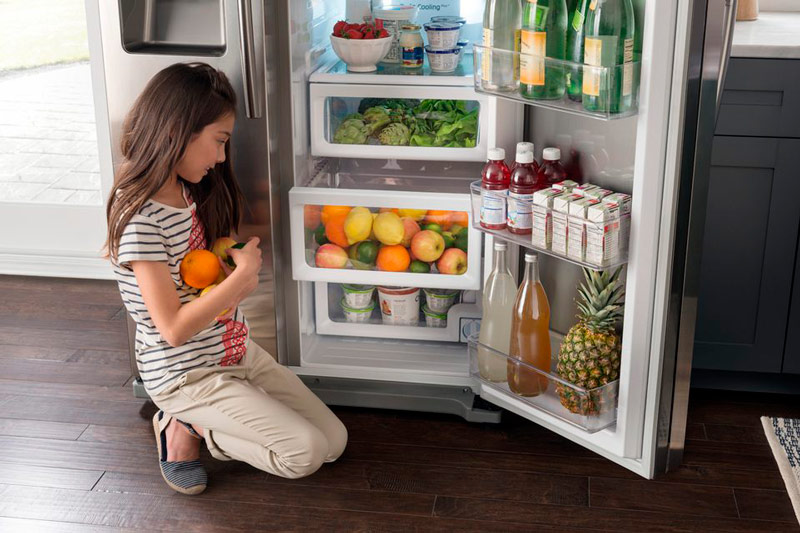
Principle 3. Store unripe fruit at room temperature, preferably in a paper bag. This is especially true for apricots, peaches, pears, plums, persimmons, avocados, kiwi and mango. The bag will become a trap for ethylene, a gas that is released by the fruit and acts as an agent of maturation. Want to speed up the process even more? Put an apple in the bag. Mature and, especially, overripe fruits should be stored in the refrigerator.
Principle 4. Store fruit in the bottom shelf of the refrigerator or in a special compartment for fruit. The exceptions are fruits that need to be stored at room temperature (whole melons, bananas, citrus fruits, unripe fruits), as well as apples - they are best kept on the top shelf of the refrigerator, separate from the rest of the fruits.
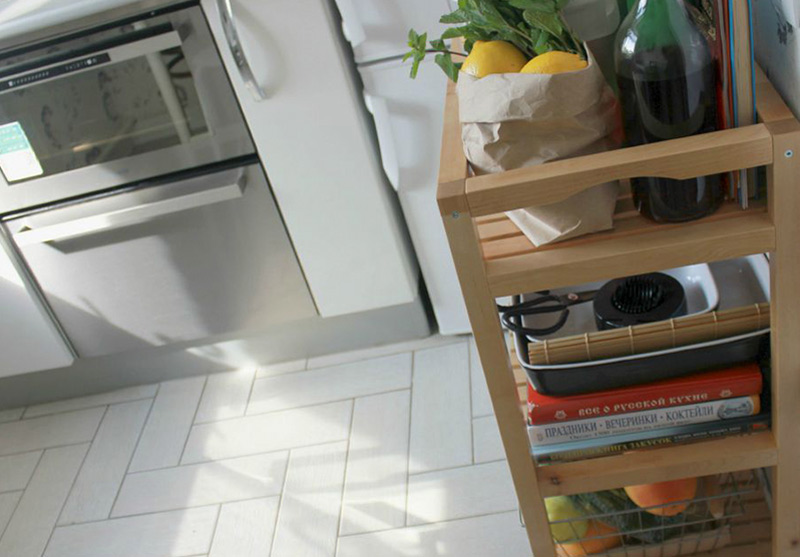
What fruits can not be stored in the refrigerator? The answer is easy to remember: bananas and citrus
Principle 5. Do not store fruit in a tightly packed container of the refrigerator. Air must circulate freely around the fruit.
Principle 6. Eat sliced fruits as quickly as possible and do not store them for longer than two days in the refrigerator. This is especially true of watermelons, melons and pumpkins, as well as persimmon. At room temperature, sliced fruits can not be stored - they, firstly, will quickly deteriorate and shrink, and secondly - will attract black flies and flies.
Principle 7. Store unwashed fruits in the refrigerator in their original packaging or as a free bag. Fruits stored at room temperature should be removed from the package immediately.
Principle 8. Always have a fruit bowl on the table or tabletop. It is better to choose a place that is always visible and easily accessible. So you and your family will not forget about these delicious vitamins, and the interior will only be decorated.
Below are a few photo ideas, how you can beautifully, conveniently and properly organize the storage of fruits at home at room temperature.
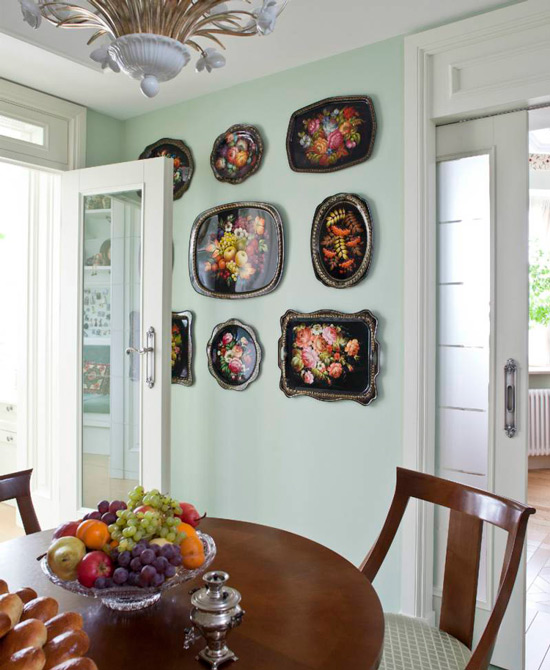
A bowl of fruit is an excellent central decoration for the dining table. In a beautiful vase bright fruit will seem even more appetizing.
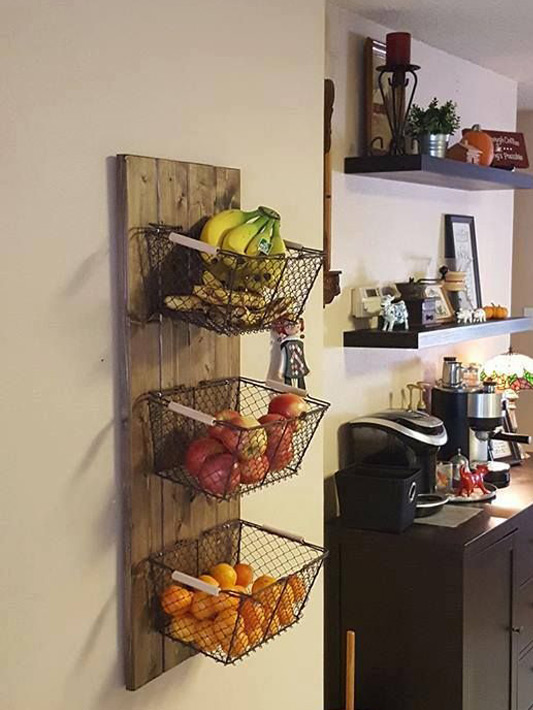
Homemade fruit holder from planks and metal baskets
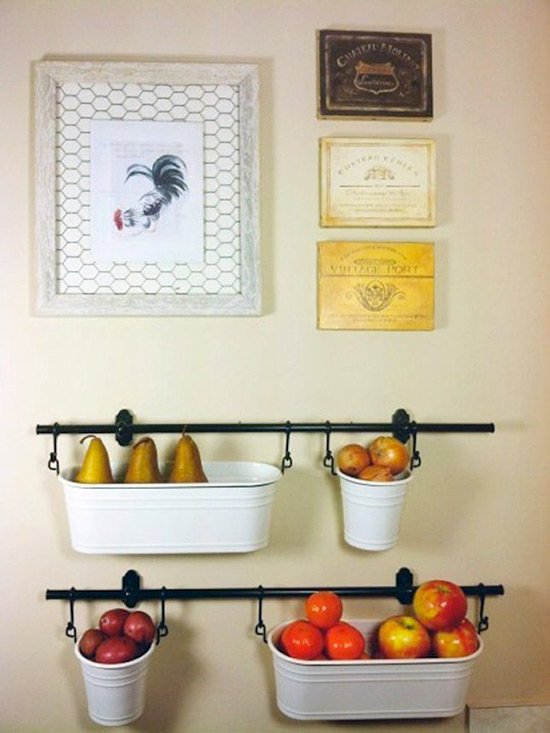
The system of kitchen rails and baskets perfectly adapted for storage of apples, pears

It is convenient to store both a juicer and a stationary blender next to fruit.
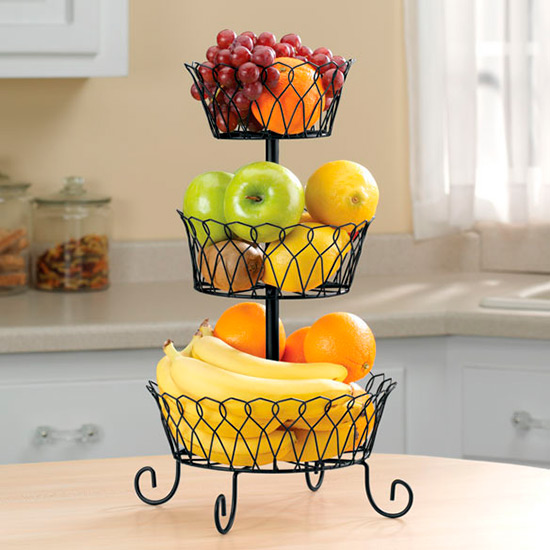
Compactly store a large amount of fruit can be here in this shelf
See also the material: How to store vegetables and greens.
Where and how much to store fruits and berries - a brief reminder
The rules for storage of fruits are often confusing, because each fruit has different requirements for conditions and terms. For example, some species ripen on a tree, and some ripen at home with their owner. Some fruits should be stored at low temperatures, and some, on the contrary, like heat. This memo will help you avoid mistakes. Keep in mind that the following guidelines suggest that your products are ripe and ready to eat.
Bananas
To bananas are not blackened, they must be stored in a closet or on the table, but not in the refrigerator.
- Shelf life at room temperature: 5 days.
- Perfect place: in a vase on a table, in a closet or in a cool and dry place.
- Hint: ripe bananas can be frozen for baking or consumed as a natural “ice cream” (the skins turn black, but the flesh will be good).
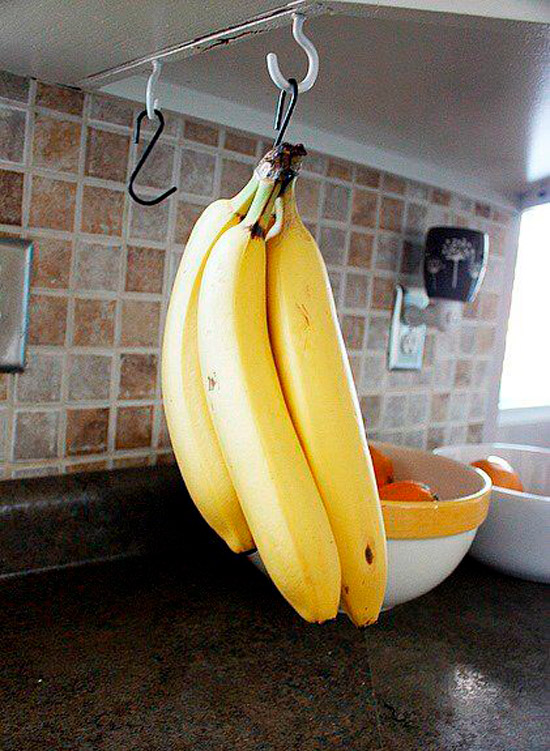
How to store bananas at home? Due to their bright color, they are simply created to decorate the interior. Put them in a nice dish / vase or hang them up on a special holder or on a hook screwed into the lower part of the hinged locker
Apples
These are the most convenient fruits for storing at home, as they can be stored both in the refrigerator and in the closet or on the table longer than any other fruit.
- Shelf life: up to 3 weeks in the fridge.
- A place: It is best to store apples on the upper shelves, most importantly, separately from other fruits.
How to store apples at home? Ideally, on the top shelf of the refrigerator. The main rule is that they should not be stored along with other fruits.
Melon, watermelon, pumpkin
With long-term storage in the refrigerator, these melons lose their taste and aroma.
- A place: in the refrigerator in the fruit compartment or in the closet / table (except for overripe and damaged fruits).
- Shelf life: up to 5-7 days in general, up to 2-3 days - in the cut.
Apricots
- A place: Unripe apricots should be stored at room temperature, preferably in paper bags.
- Shelf life in the refrigerator: 5 days.
Citruses
Citruses are those fruits that are best kept in a vase on a table, in a cardboard box in a cupboard or other dry and preferably cool place, but not in a refrigerator. Therefore, buying them costs only a week in advance, but not more. However, it is also possible to store them in the refrigerator for quite some time (up to 2-3 weeks), although in a week or ten days the fruit will lose its flavor, juiciness and taste. Lemons and limes completely absorb extraneous odors.
- A place: in the closet, on the table. If in the refrigerator, then on the bottom shelf or in a special compartment for fruit.
- Storage time: on the table - from 3 to 7 days, in the refrigerator - oranges up to 2 weeks, lemons, limes and grapefruits up to 3 weeks, tangerines - up to 1 week).
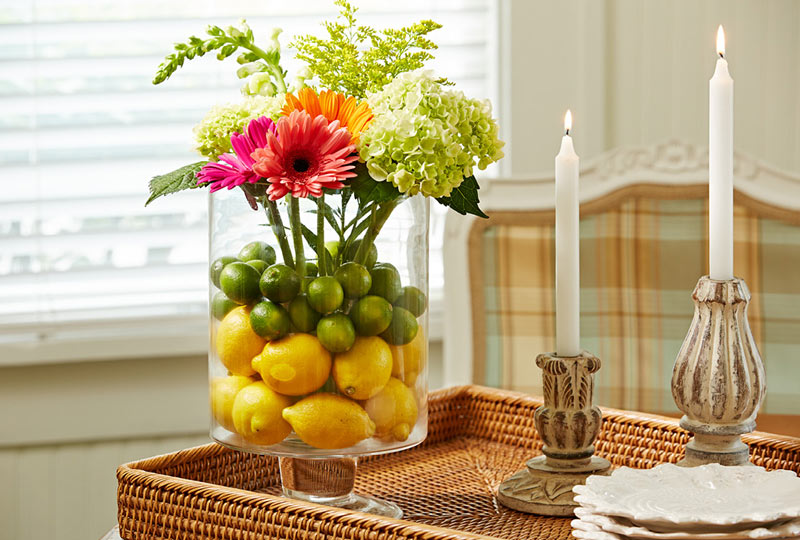
Festive table can be decorated with just such a fruit composition. Simply place a smaller vase in the center of a large vase and fill it with water and flowers, then fold your citrus in the remaining space.
Pears
Do not be in a hurry to get upset if the pears on the store counter are only green and firm. The fact is that these fruits are harvested immature, because they begin to rot on the tree even before ripening. It turns out that buying a pear for the week ahead is immature and waiting for them to ripen at home. When buying soft and juicy fruits, try to eat them as quickly as possible.
- A place: in the closet, on the table.To accelerate the ripening of the pear, you need to decompose into paper bags and hold at room temperature. Ripe and over-ripe pears can be kept in the fridge for one or two days (on the bottom shelf or in a special fruit compartment).
- Deadline: 5 days. Asian pears are stored longer - up to 7 days at room temperature and a few weeks in the fridge.
Grapes
- A place: Grapes are best stored in a paper bag (or in perforated plastic packaging) in the refrigerator.
- Shelf life: from 1 to 2 weeks. But it is better to eat the grapes for 3 days, later it will begin to frown.
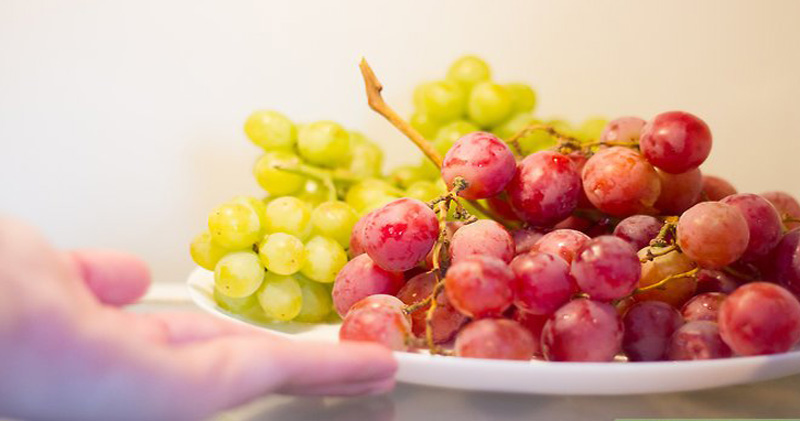
Kiwi
- A place: ripe fruit is in the fridge, unripe - at room temperature.
- Deadline: 4 days on the table, and up to several weeks - in the refrigerator.
Mango
- A place: fridge.
- Deadline: 4 days.
Peaches and Nectarines
- A place: fridge.
- Deadline: 5 days.
A pineapple
- A place: in its entirety, at room temperature on a table or in a closet, pineapple sliced or cut into slices is stored in a refrigerator.
- Terms: 5 days in general form at room temperature and 3 days in the refrigerator (in cut form).
Plum
- A place: refrigerator, unripe plums stored at room temperature;
- Deadline: 5 days.
Persimmon
- A place: unripe fruits stored at room temperature, waiting for ripening, then eaten as quickly as possible.
- Deadline: after ripening - 2-3 days.
Grenades
- A place: fridge.
- Deadline: whole pomegranate can be stored for up to 3 weeks, pomegranate seeds are stored for 3 days.
Blackberry
- A place: in the refrigerator, laid out in one layer on a paper towel.
- Shelf life: 2 days
Blueberry
- A place: in a refrigerator.
- Shelf life: Week 1.
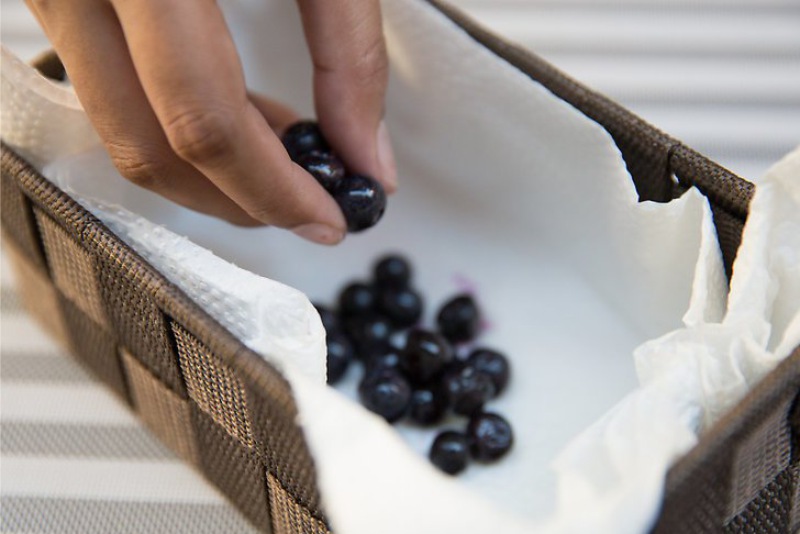
Cherries, Cherries
- A place: in the refrigerator in an open bag or bowl.
- Deadline: 3 days.
Cranberry
Cranberry is the most useful berry that you can safely buy for future use.
- A place: fridge.
- Deadline: 1 month.
Raspberries
- A place: in the refrigerator, laid out in one layer on a paper towel.
- Shelf life: 3 days
Wild strawberry
- A place: in a refrigerator.
- Shelf life: 3 days.
- 12 tips on how to keep food fresh longer and stop throwing them out
- Storage Guide 5 types of oils: olive, flaxseed, coconut, sunflower and cream
- 8 questions and answers about storing honey
- Storage in the kitchen - 17 super-efficient solutions and life hacking
- What should be the temperature in the refrigerator?

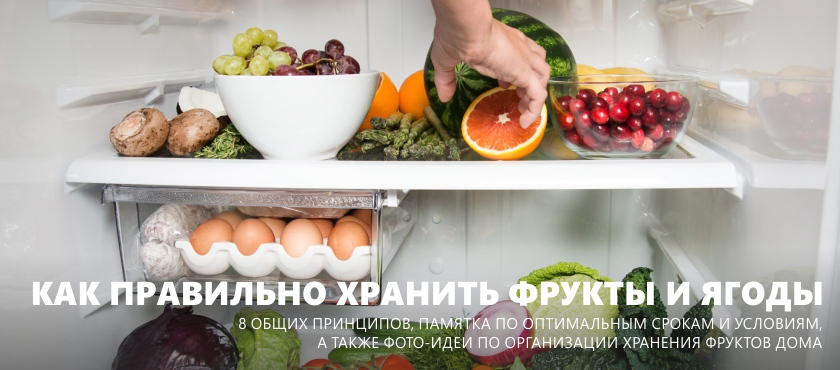

 (Rate the material! Already voted:10 average rating: 4,70 from 5)
(Rate the material! Already voted:10 average rating: 4,70 from 5)